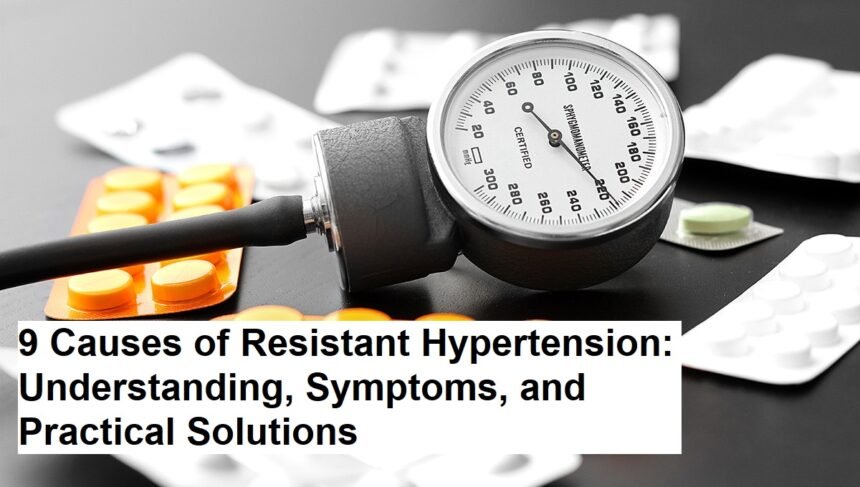Introduction
High blood pressure is already a serious health issue, but what if your blood pressure remains stubbornly high even after taking medications? This is known as resistant hypertension, a condition that many people don’t fully understand. In this article, we’ll dive into the 9 causes of resistant hypertension, explore the definition explained by doctors, and share practical tips to recognize symptoms and solutions you can apply.
What is Resistant Hypertension?
Explanation from Doctors
According to medical experts, resistant hypertension is a type of high blood pressure that does not respond well to treatment. By definition, it occurs when your blood pressure remains above target levels even after taking at least three different types of antihypertensive medications, including a diuretic.
Doctors also note that resistant hypertension is more than just “difficult-to-control blood pressure.” It’s often linked to underlying health conditions, lifestyle factors, or even medication issues that make it challenging to stabilize.
Signs and Symptoms of Resistant Hypertension
Recognizing the warning signs early can make a big difference. Some common symptoms include:
- Persistent high blood pressure despite treatment
- Frequent headaches or migraines
- Shortness of breath
- Chest pain or palpitations
- Fatigue or confusion
While these symptoms may overlap with regular hypertension, their persistence despite medications is a red flag. If you notice these patterns, it’s essential to consult your doctor for proper evaluation.
9 Causes of Resistant Hypertension
1. Obesity and Excess Body Weight
Being overweight increases the strain on your heart and blood vessels. Excess fat tissue can also make medications less effective. Losing even a small amount of weight (5–10% of your body weight) can significantly improve blood pressure.
2. Excess Salt Intake
Too much sodium in your diet is one of the leading triggers. Many people underestimate “hidden salt” found in processed foods, canned soups, sauces, or snacks. Reducing salt intake and switching to fresh foods can help lower resistance to medications.
3. Chronic Kidney Disease (CKD)
Doctors explain that kidney disease and resistant hypertension are closely linked. Damaged kidneys cannot regulate fluid and sodium properly, leading to uncontrolled blood pressure. Managing kidney health is crucial in this scenario.
4. Sleep Apnea
Obstructive sleep apnea causes repeated interruptions in breathing during sleep, leading to stress on the cardiovascular system. Research shows that treating sleep apnea with CPAP (Continuous Positive Airway Pressure) therapy can reduce resistant hypertension.
5. Medication Non-Adherence
Sometimes, resistant hypertension isn’t about the body—it’s about behavior. Skipping doses, misunderstanding prescriptions, or stopping medications too soon are common issues. Setting reminders or using pill organizers can prevent this.
6. Secondary Hypertension from Other Conditions
Certain underlying conditions such as thyroid disorders, adrenal gland tumors (pheochromocytoma), or Cushing’s syndrome can cause resistant hypertension. Identifying and treating the root cause is key.
7. Excess Alcohol Consumption
Drinking too much alcohol can raise blood pressure and reduce medication effectiveness. Cutting back—or eliminating alcohol entirely—has a positive effect on blood pressure control.
8. Certain Medications or Substances
Over-the-counter drugs like NSAIDs (ibuprofen, naproxen), decongestants, and even herbal supplements can interfere with blood pressure control. Always check with your doctor about possible drug interactions.
9. Genetic Factors
In some cases, resistant hypertension runs in families. Genetics can influence how your body regulates salt, hormones, or responds to medications. While you can’t change your genes, lifestyle modifications and personalized treatment can still help.
Practical Solutions if You Experience Resistant Hypertension
Medical Solutions
- Review Medications with Your Doctor: Adjusting the type or dosage can sometimes improve control.
- Check for Secondary Causes: Blood tests, imaging, or sleep studies can help identify hidden conditions.
- Add-on Therapies: Sometimes, an additional medication may be prescribed for better results.
Lifestyle Changes
- Adopt a Low-Sodium Diet: Aim for less than 1,500 mg of sodium per day.
- Maintain a Healthy Weight: Even small weight loss can lower blood pressure.
- Exercise Regularly: 30 minutes of moderate activity, 5 days a week, is recommended.
- Limit Alcohol and Quit Smoking: Both habits can make resistant hypertension worse.
- Prioritize Sleep: Managing sleep apnea or improving sleep quality reduces risk.
Self-Monitoring Tips
- Track your blood pressure at home with a reliable device
- Keep a blood pressure diary to show your doctor
- Pay attention to how you feel—headaches, fatigue, or dizziness should not be ignored
When to See a Doctor
If your blood pressure remains high despite multiple medications, or if you experience concerning symptoms like chest pain, blurred vision, or frequent headaches, don’t delay medical consultation. Resistant hypertension can increase the risk of heart disease, stroke, and kidney failure if not properly managed.
Conclusion
The 9 causes of resistant hypertension range from lifestyle factors like obesity and salt intake to medical conditions such as chronic kidney disease and sleep apnea. With the expert explanations from doctors about the definition of resistant hypertension, and by recognizing signs, symptoms, and practical solutions, you can take proactive steps toward better blood pressure control.
Managing resistant hypertension may seem overwhelming, but with the right mix of medical care, lifestyle adjustments, and self-monitoring, it’s possible to bring your numbers down and protect your long-term health.
Have you or someone you know experienced resistant hypertension? What lifestyle changes or solutions worked best for you? Share your thoughts and experiences in the comments below—your story might inspire someone else on their journey to better health!












